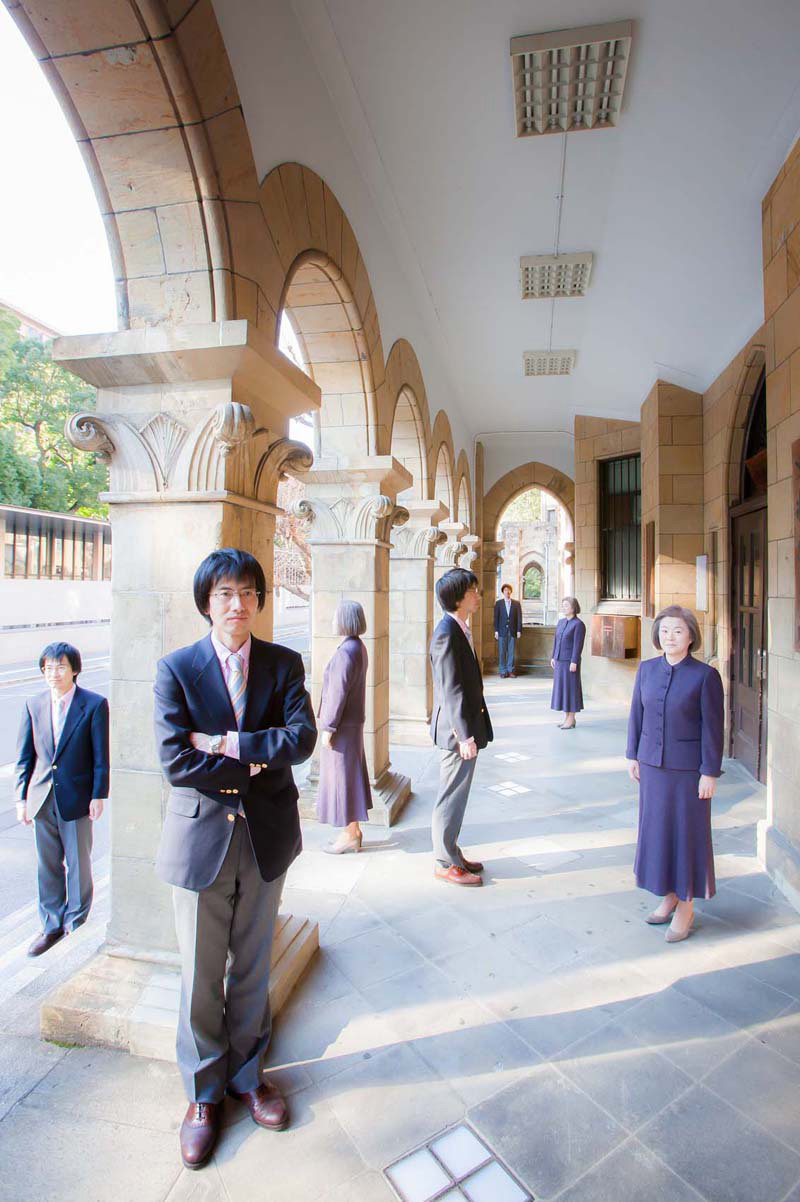Yokoyama: I have brought you a little gift today. You'll find that it details the history of the universe. (Yokoyama presents a bag specially made for the Research Center for the Early Universe (RESCEU).)
Hongo: Thank you very much. This is the first time that I have seen this historical chronology in a color version. Are these made at RESCEU?
Yokoyama: Yes, we distribute them at international conferences and other events.
Hongo: I am happy to receive such a wonderful gift-it makes me feel as if I have become a cosmologist myself (laughs).
Relative time
Time that links to the virtual world
Hongo: The theme for this edition of TANSEI is "time" and we have planned a cross-disciplinary discussion between the science and humanities on the relationship between research and "time." Given that history is perhaps the subject most closely associated with time, I will be participating in the discussion as a specialist in medieval Japanese history. When thinking about who to invite from the sciences, we decided to invite you, Professor Jun'ichi Yokoyama, given that your area of expertise, cosmology, is one that deals with time from a very much longer perspective.
Yokoyama: Thank you for inviting me today.
Hongo: Can I ask you first to give an overview of your area of research?
Yokoyama: My research is exactly related to what is printed on the bag I have just given you-the history of the universe. The universe is extremely large. It spans more than 10 billion light years and is more than 10 billion years old. In fact, in the last decade or so, it has become possible to gauge the age of the universe accurately. Since the universe began 13.8 billion years have passed. Cosmology is the study of how the universe expanded from a time when it was approximately the size of a single elementary particle, how the stars and galaxies were formed and what process have led to the present. My particular area of study is the origins of the universe.
Unless we first consider that in its initial stages the universe expanded extremely rapidly, we cannot account adequately for its current massive size. The rapid and accelerated expansion of the universe is referred to as "inflation," and why and how this occurred is the area I am researching.
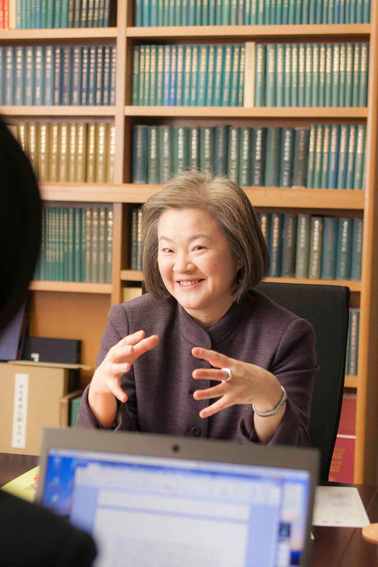
Photo: Jun'ichi Kaizuka.
Another thing we have learned thanks to measurements in the last couple of decades is that the current expansion of the universe is speeding up. Why should this be the case? Newton's law of universal gravitation states that every mass always attracts every other mass. This law would suggest that after the Big Bang, even if the universe expanded very quickly, eventually the force of gravity would slow down this process of expansion. However, today the expansion of the universe continues to speed up. This shows us that there is some kind of force repelling against gravity that exists in the void of space. Another of my areas of study is to seek to identify what that force is.
So, you can see that the two themes of my research are, "How did the universe begin and how did it expand so dramatically in its early stages?" and "Why is the current expansion of the universe continuing to accelerate?" Although the timescale we measure the current expansion of the universe is in excess of 10 billion years, the initial inflation of the universe in the instant after its genesis took only 10-30 second.
Hongo: I thought that your research covered the longest period of time, but it turns out that it also covers the shortest period of time too, doesn't it? Whether large or small, both of these are truly epic in scale.
Yokoyama: And my research is also grounded in the basic laws of physics. Professor Hongo, your area of research is medieval Japanese history, I believe?
Hongo: As history is based largely on documents and records, in the case of Japan, recorded history dates back approximately 2,000 years. I am engaged in study of the medieval period, meaning that my "territory" dates from the late 11th century up to around the 16th century. The historical materials that date from those times, including ancient documents and diaries, form the basis for my research. As you know, since ancient times the emperor system has continued in Japan, right up to the present, but the medieval period was one that saw the creation of a military administration, known as the Kamakura bakufu, or shogunate. From this period the warrior classes gradually consolidated their hold on power and wielded the reins of substantive governance until the Meiji period in the mid- to late-19th century. However, during this entire period the aristocracy and imperial court, with the emperor at their apex, continued to reign from the imperial capital of Kyoto. The medieval period in Japan can be seen as a period when one country was subject to two administrations, in an ambiguous, complex and delicate arrangement, which at times saw the two in confrontation and at other times in collaboration. It is a period that is constantly beset with issues such as "What is a state?" "What does it mean 'to rule'?" and "What is power?" From among these various issues, my research is particularly focused on the theme of "What did society (the people) seek to gain from the process of the passing down of cultural assets of the imperial and aristocratic administrations?" A further mission of the Historiographical Institute where I work is to publish historical sources in book form. I am currently engaged in work to publish the diary of an aristocrat in the Muromachi period (1337-1573) entitled Sakkaiki. The work involves transposing the hand-written manuscript into standard typeface so that it can then be published. (Brings out the original hand-written diary.)

Sakkaiki
Sakkaiki is the diary of Sadachika Nakayama (1401-1459), an aristocrat who lived during the Muromachi period. Although there are many copies of this diary, the Historiographical Institute possesses four of the original scrolls. This diary is a valuable historical source that tells us about the ceremonies and rituals of the imperial court in the early 15th century, as well as the relations between the imperial court and the Muromachi shogunate and the political situation of the era. © Historiographical Institute, The University of Tokyo.
Yokoyama: Is that the diary itself?
Hongo: Yes. You can see that the diary entries are written on each calendar day. In those days the head of every aristocratic family would keep such a diary, recording all manner of public and private events. These calendars record the good and bad of daily life and various events and are known collective as guchureki or almanacs. It was the style of these aristocratic families to first confirm with the calendar what direction, actions and events it would be auspicious to conduct, or indeed to avoid, on a certain day, and to arrange their schedule accordingly. Although we tend to assume that as these families were aristocratic they were unconcerned with keeping to rigid time structures and could engage in a life of graceful leisure, in actual fact there were predetermined ceremonies and rituals that had to be performed at certain times of the year. In November each year the calendar for the following year's events would be compiled and at the year's end the schedule for these events would be decided and a person would also be designated for leading each ceremony and ritual. The role of this leading person would be to ensure that all the relevant people convened at the appointed time to perform the ceremony. However, in actual fact, from what we can see in these diaries, it was no easy matter to accomplish the task of bringing everyone together. There are entries that tell us that there were often times when people were either absent or turned up late, meaning that the ceremony took place in the middle of the night. There were even times when child-emperors would be asleep, leading to further delays.
Yokoyama: Are there still many historical records that have not yet been transcribed into print?
Hongo: These records survive in various locations. The combination of Japanese-made paper and ink is extremely durable, meaning that documents recorded using these media last for many, many years. The Historiographical Institute has been working to convert these ancient records into printed format for over 100 years and currently there are more than 1,000 books that have been published.
Even in global terms Japan has a rich heritage and a wealth of historical documents. This has led to improvements in the precision and comprehensiveness of historiographical research and given the sheer volume of records that still exist there is still much work to be done.
Shall we talk a little about the main theme of our discussion today? Could you talk a little about time in the context of space?
Yokoyama: Well, first of all, in physics both "time" and "space" are extremely important. Isaac Newton, the world-renowned physicist and mathematician refers to "absolute time" and "absolute space" in the opening to his seminal work Philosophi? Naturalis Principia Mathematica (Commonly known simply as Principia, or in English as Mathematical Principles of Natural Science). "Absolute time" is defined in Principia like this: "Absolute, true and mathematical time, of itself, and from its own nature flows equably without regard to anything external."
In other words, Newton is saying that time is like a boat moving slowly down an enormous river at the same speed as the flow of the water, always in a uniform manner. He states that "absolute time" is simply something that exists in the void of space and is always unchanging and unmoving. If you think about this concept very hard, you realize that in order to know for certain that the flow of time is uniform, you need something to measure it against. However, as there is no other separate "time" that would provide a means of comparison, we have no way to measure "absolute time." A physicist and philosopher by the name of Ernst Mach was severely critical on this point, noting that "Absolute time and absolute space are nothing more than hypotheses." Albert Einstein used the notion of absolute time and space to come up with his theory of relativity, from which the fundamental concepts of "time" and "space" in physics as we currently understand them were created. "Time is relative." When considering space this is the concept of "time" on which we base our work.
Hongo: It is an image of time that is quite far removed from our daily perceptions and experiences isn't it?
Yokoyama: Yes. What is more, when we think about space, a very important concept is "changes of timescale." The inflation that occurred at the start of the universe took place in an infinitesimally short time period, many, many millionths shorter than a second. Furthermore, 28% of the entire elemental mass in the cosmos is composed of helium, and we now know that most of this 28%, or 24% of all elemental mass, was created in the three minutes after the universe began. In today's world we can prepare a cup of instant noodles in three minutes, but it would be a bit of a tall order to create helium that comprises 24% of the elemental mass of the universe! (laughs) These three minutes after the universe began show us just how fast the speed of change was. For example, a one-year old child today will become two years old next year, but for that child the extra one year is exactly the same length as it is been alive so far. On the other hand, for a 50-year old person, the one year between 50 and 51 is only one-fiftieth of that person's life. This analogy works for the universe too, because since it began and up to today it could be said that the timescale has continued to change. This is one of the characteristics of "time" when we consider the universe. It is believed that before the universe began there was only chaos and there was no order such as "time" that progressed in a constant direction. From the midst of this chaos the universe was born and continued to advance in a constant direction. As it rapidly expanded and cooled stars and galaxies formed. It is in these various complex directions that order was advanced, becoming what we know as the universe today, with a timescale that is constantly changing. Measuring the universe today, we are in actual fact measuring what has happened in the past. As information flies through space at the speed of light, the farther we look, the farther we are looking back in time.
Hongo: It is almost like time is being converted into distance, isn't it?
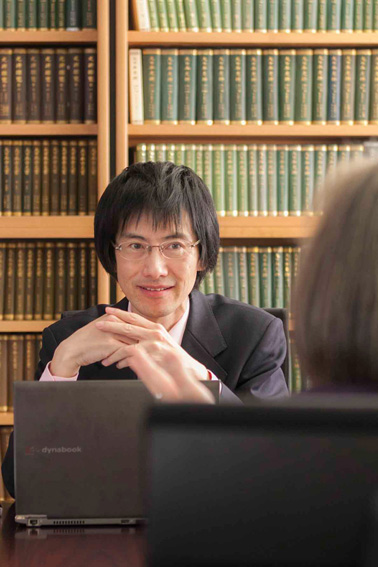
Photo: Jun'ichi Kaizuka.
Yokoyama: Yes, that's true. So now can I ask you the same question? What is "time" when viewed from the perspective of Japan's medieval period?
Hongo: My subject seems very small after hearing about the grandeur and scale of your specialty (laughs). By reading old text from the medieval period we can see that pre-modern people ascribed great positive significance to rituals of the imperial court, being conducted in accordance with precedent. Knowledge and study of the procedures and methods relating to these ceremonies and rituals was referred to as Yusoku Kojitsu (knowledge of court rules and protocol), and by engaging in court rituals exactly in accordance with these procedures, it was possible to engage in something that your predecessors from a century before had also done. I think that this point shows that the people of that period lived their lives while engaging in a kind of dialogue with their ancestors that transcended time. By adhering exactly to past precedent a type of virtual world was created, harking back to the past, which existed in parallel with the practicalities of the real world at the time. However, even in the practicalities of the real world, we can see that people placed their faith in contracts and other documents, a great deal of faith in fact (laughs). The origins of this exchange of documents among the common people can once again be seen in the formulaic written styles that were preserved and passed down from the imperial court. In other words a format that had been passed down in a hypothetical sense became a pillar by which to support the society of the day. "Time" as viewed in the context of the medieval period in Japan can be seen as being somewhat flat in nature, providing a link to the past, but it can also be seen as something that provided, where necessary, the means for regeneration and renewal in the real world.
Both space and ancient historical sources are tied to the past
Hongo: Has it always been the case that "time" has been recognized and studied in cosmology?
Yokoyama: In actual fact the concept that the universe changes over time is not so old. It was in 1929 that the astronomer Edwin Hubble discovered that the universe is expanding. Then, in 1948, directly after the Second World War, the physicist and cosmologist George Gamow proposed the theory that I have already mentioned, that massive amounts of helium were created in the three minutes after the genesis of the universe. The radio emissions from the remnants of that first incredibly hot universe were confirmed through measurements in 1965. Even Einstein did not think that the universe changes. The concept of time evolution is one that has been incorporated into the study of cosmology since the 20th century. As you can appreciate, cosmology has constantly been trying to keep up with measurements and theories. Only when we are able to first reconcile measurements and theories, will be able to say that "we have understood the evolution of the universe."
Hongo: I see, so it is the case that the universe is "evolving"?
Yokoyama: I think that "changing" would probably be a better world, but it is generally the case that "evolution" is the word that is commonly used. In the sense that the universe has changed from an incredibly primitive state around the time of inflation and the Big Bang to become the complex expanse it is today, full of stars and galaxies and comprising many varied elements, then it is probably appropriate to use the word "evolution." However, it is still not the case that we understand everything about the process of the evolution of the universe. There are still periods for which we cannot acquire sufficient data. By making measurements using radio waves, today we can trace back the origins of the universe to a point 380,000 years after it was born.
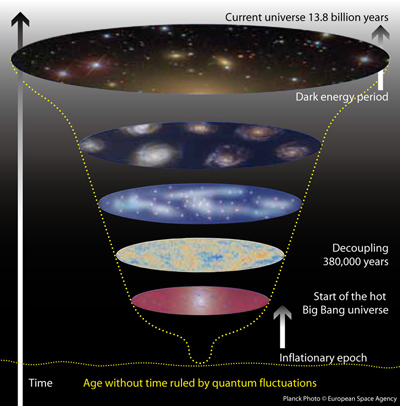
According to modern physics the universe arose out of the chaos of quantum fluctuation, after which there was a period known as the inflationary epoch when the universe expanded rapidly to massive proportions. This was followed by the Big Bang and 13.8 billion years later the result of this ongoing expansion is the current universe with all its complex structures. Planck photo © European Space Agency.
Hongo: (Points to diagram on bag) This is the period known as "decoupling"?
Yokoyama: Yes, "decoupling of radiation and matter," when the foggy universe cleared up. Prior to that period you enter a cloudy region, where you can't see using radio waves. In the study of Japanese history are there periods for which there are many records and other periods where there are few remaining records?
Hongo: Yes, there are. For periods from which historical documents remain we can understand in detail "what happened and when," but there are also blank periods where there are no extant records. As is the case in space, where there may be regions where stars are very densely packed together, in history too, there are periods where there is a wealth of documentary evidence and others where almost everything has been lost. So in historical research you could say that different periods have different "depths of time."
Yokoyama: For historians, is today, February 13, 2013, perceived with the same emphasis or weight as the day, September 19, 1331, for example? Is it not the case that the farther you go back in time the weight of a single day decreases due to the laws of perspective?
Hongo: Historians do not take the view that the weight or significance of a day declines due to the laws of perspective. As a historian myself I actually feel that a day 700 years ago perhaps has greater weight for me than a day in the present. It's perhaps a case of there being an elevated sense of rarity. In cosmology, I imagine that as the precision of measurements and experiments has increased, this has also provided a wealth of new data that has challenged established theories?

Photo: Jun'ichi Kaizuka.
Yokoyama: Yes, this is something that happens. Theoretical models are discarded once it is shown that they do not match actual observational evidence. There are constant breakthroughs occurring in the field of cosmology. The basic laws that we work by are in themselves very simple and it is based on these guiding principles that research and study continue.
Hongo: It is certainly a field in which there seems to have been a great deal of change as research has progressed.
Yokoyama: Yes. Have there been such paradigm shifts in the study of Japanese history?
Hongo: The study of the history of Japan is a field that the nation has treated with a great deal of importance for a long time. This is because history has always been granted the mission of justifying the origins of the nation. In the period leading up to the Second World War an emperor-centric view of history was proposed, but was duly discarded following defeat after the war. This is one example in modern history that could be referred to as a significant paradigm shift. In the post-war period the materialistic view of history has become mainstream. From the 1970s to the 1980s the historical views propounded by the historian Yoshihiko Amino had a great influence, not just on medieval Japanese history, but on all areas of learning in the field of humanities. In actual fact, it has been pointed out that Amino's work shares some similarities with that of Kiyoshi Hiraizumi, who was one of the leading scholars of imperial history. I think that further work will be required to examine the relationship between the pre-war imperial-centric view of history and post-war Japanese history. In addition, in the Edo period there was a field of learning known as "Kokugaku" or "national learning," which sought to study Japan's past. Kokugaku existed as an area of learning until the war, but has now become a somewhat neglected genre. The Second World War truly represents a break in the flow of learning from the pre-modern period onwards. However, one of the reasons that historical sources and documents have been passed down over the centuries is thanks to the fact that Kokugaku scholars collected these documents and used them in their research. Much of the study of modern Japanese history is built on the traditions of Kokugaku. In that sense, I feel that we should delve further into subject of Kokugaku and see what insights it can provide.
Yokoyama: Are all of the historical sources that have been passed down to the present from the pre-modern era the original sources?
Hongo: We are extremely lucky in Japan to have tremendous quantities of original materials. What is more, many copies were also produced, thanks to the desire of people from back then to leave such sources to posterity. Whether they are originals or copies, we can say that the documents that remain today contain within their pages the passage of eons of time up to the present. They are tied to the past and bring history with them.
Yokoyama: Do you view such data from the past with an open mind? Or is it the case that you look at them on the basis of a certain hypothesis, with a view to reaching a certain conclusion?
Hongo: It depends on the case. While it is important to take a broad view, if you approach a source with preconceived ideas you sometimes fail to appreciate its essential substance or nature. I imagine that in the sense that things need to be examined and authenticated, the same can be said for cosmology research, can it not?
Yokoyama: You have pointed out that ancient historical documents serve to tell us about the circumstances of the times in which they were written and that in that sense they bring history into the present. In actual fact, the same can be said for the history of the universe. As I mentioned earlier, by using radio waves we can see back to a time 380,000 years after the Big Bang, but in the future, by using gravitational waves we should be able to see directly back to the inflationary epoch prior to the Big Bang. As well as being able to understand the situation during that period of inflation, we should also be able to understand more about the period between inflation and the present. So it can also be said that the study of cosmology is also bringing history with it.
The desire to look back, the desire to know things now
Hongo: This may be a bit of a simplistic question, but are all researchers of cosmology engaged in research about what the past universe was like?
Yokoyama: Although there are times when we talk about the future of the universe as an extension of research into the past universe, there are no researchers who specialize in "universe forecasting" as if it were weather forecasting (laughs). In that sense, cosmologists are also historians.
Hongo: I get the feeling that people have a natural desire to look at something and think "I wonder what this was like originally?"
Yokoyama: Yes, I agree. It seems to be a very fundamental human desire.
Hongo: I think that this desire to "look back" is a basic motivation for historians. It is a desire that is based on the fact that although we know the outcome, we seek to understand the process that led to that outcome. I feel that in today's world we are always seeking to know what "we should do now" and "need to predict what may happen in the future," which makes it a little difficult for the basic human desire to "look back" to come to the fore.
Yokoyama: In the case of cosmology, at the same time as studying the past based on a desire to "look back" we are also studying the present universe, out of a desire to "know about the present." In the case of the universe we know very little about the present situation, let along the future or the past. I imagine you will have heard talk of dark matter and dark energy, and the reality is we have only discovered a mere 5% of the energy in the present universe. However, the laws of physics dictate that everything has a past, present and future. However much we look back, or cast our gaze to the future, we continue our research based on the prerequisite that everything should be described in the context of the same basic laws of physics. If new observational evidence is discovered that contradicts these conventional laws of physics, then it will be time to rewrite those laws. Are there any similar basic rules or laws in the field of Japanese history?
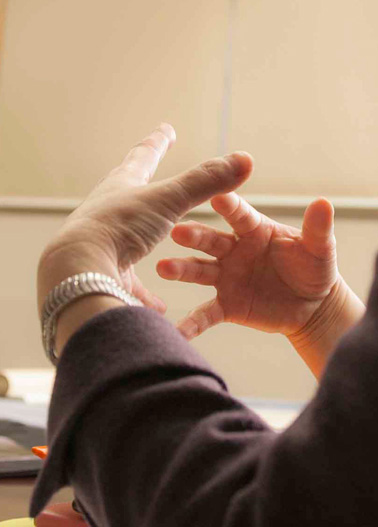
Photo: Jun'ichi Kaizuka.
Hongo: I believe that human society basically evolves, progresses and grows. From ancient times up to the present society has transformed, based on growing recognition and respect for the dignity of more and more people. It is a case of society continuing to grow and progress. The medieval period that my research is focused on was one in which very few people could read or write, and the majority of the population lived in primitive conditions. The warriors of the Kamakura period were a truly violent bunch, which can be seen in the lessons and admonishments they left for their successors, such as "When you join a banquet it is bad manners to take the food of the person next to you," or "You shouldn't immediately kill a person just because you were angry. Have a good night's sleep and think things over thoroughly." (laughs) Although it was a very impulsive world, where one person may suddenly kill another, I get the impression that these aspects of society have become more sophisticated over an extended period of time. By the time we reach the Edo period society is governed on the basis of legal and regulatory force, which have been developed and codified into rules designed to prevent outbreaks of violence or confusion, including the prohibition of acts of vengeance or retaliation. I believe that through the formulation of a certain degree of order, unnecessary confrontation decreases, thus making it more difficult for unproductive cycles to propagate, and society starts to mature in a direction that respects basic human dignity.
We are coming to the end of our allotted time. Before we finish I have a very silly little question that I wanted to ask you today: What does "time" mean for you (as a researcher)? For me, "time" is something that "slips rapidly away." It is harsh in that it is like savings in a bank account, it continues to disappear rapidly. (laughs)
Yokoyama: You are right of course (laughs). For me, I think that "time" is something that "is gradually flitting by." Compared to the past we are now able to acquire all kinds of information easily from the internet. That is incredibly convenient, but it also means that every day, day in and day out, new academic papers are published online and we can see in real-time what kind of research other scientists around the world are engaged in. This means that academic and research competition has intensified in a real-time environment and when I think back to my student days I get the feeling that research today is conducted on a very short timescale. In the past we were able to consider things at a more relaxed pace.
Hongo: I think that trend is one that is strongly felt in scientific research in particular, isn't it? Before we finish today I would like to attempt to summarize our discussions on "What is time for me in my area of research?" For my part, I would summarize that "time" is something that "brings many things with it." Or perhaps it is something that "accumulates things and brings them together." As I said earlier, I think that historical sources such as documents and diaries represent the passage of time and bring with them the various events that have occurred in the period between when they were written and the present. Even from the perspective of the history of research itself, all learning brings with it the trail of the passage of time.
Yokoyama: From the perspective of cosmology, "time" is something that is "ever-changing." This "ever-changing time" is something that is very far removed from our everyday perceptions of time. Even the same one second has a completely different meaning if it is one second now or one second at the time when the universe began. I believe that to seek to elicit some kind of essential or intrinsic phenomenon from within this "ever-changing" time is what it means to study cosmology.
February 13, 2013
Historiographical Institute Meeting Room
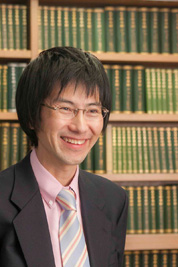
Professor Jun'ichi Yokoyama
Since 2005 Jun'ichi Yokoyama has served as professor at the Research Center for the Early Universe (RESCEU). His previous positions have included assistant at the School of Science of the University of Tokyo, researcher at the Fermi National Accelerator Laboratory in the United States, assistant professor at the Yukawa Institute for Theoretical Physics of Kyoto University, and visiting research fellow at Stanford University. Professor Yokoyama received his Ph.D. from the University of Tokyo in 1989.
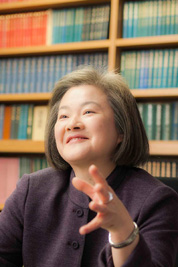
Professor Keiko Hongo Since 2010 Keiko Hongo has served as professor at the Historiographical Institute of the University of Tokyo, after serving previously as assistant and assistant professor at the institute. Professor Hongo received her Ph.D. from the University of Tokyo in 1998.



